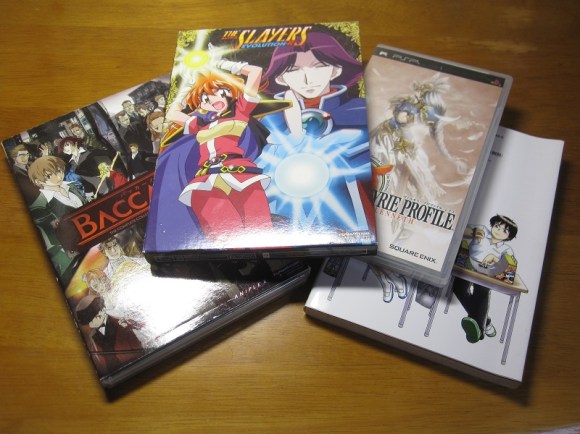
Popular light novel author shares his skepticism about the ploy.
Aside from all the food and shelter, I really do have to thank my parents for taking their son’s burgeoning interest in Japanese animation in stride. When teenage Casey said, “Hey guys, I want to go to this anime convention that’s an eight-hour drive away and watch the premiere of Macross Plus,” they said “Sure.” They didn’t bat an eye when the percentage of my wardrobe that was made up of anime T-shirts moved past 50. Once, my dad even credited my quick recovery from a nasty cold to the protective eyes of the Slayers cast watching over me from the poster hung on the wall above my sickbed.
But I realize not everyone is blessed with such accepting parents, as recently observed by Kenji Inoue, writer of the light novels which serve as the basis for the magical high school anime and manga Baka and Test. Due to the nature of his profession, Inoue doesn’t necessarily have to commute to an office, and earlier this week he decided to get some work done at a coffee shop.
However, he was distracted by the conversation some of the other customers were having, which he later related through his Twitter account.
先日、喫茶店で仕事をしていたら、
— 井上堅二@ぐらんぶる21巻10/5発売中 (@Kenji_Inoue_) November 9, 2016
『うちの娘はオタクにしたくないからアニメとか絶対見せないようにしてるの!』
と言っているお母さんがいたので、
「ああ、それ高確率でオタクになるな」
と思いました。
だって、本来持つ面白さに加えて背徳感まで与えちゃってますから。
“A woman was saying ‘I don’t want my daughter to become an otaku, so I let her watch absolutely no anime!’ When I heard that, I thought to myself ‘That kid has a high probability of becoming an otaku.’ I mean, on top of the latent fun-factor, now she’s adding the appeal of getting away with something you’re not supposed to do.”
Online commenters were quick to voice their agreement.
“Classic Caligula effect.”
“She’s going to raise a fine otaku.”
“She sounds just like my mom. I also turned out to be a total otaku.”
“As long as it doesn’t hinder her daughter’s ability to have social interactions, what’s wrong with her becoming an otaku?”
In the mom’s defense, in Japan the word “otaku” has long carried with it the connotation of being incapable of having fulfilling life experiences unless they’re somehow connected to the individual’s chosen hobby. Classic anime Otaku no Video aside, it’s still a relatively recent phenomenon for people in Japan to proudly self-identify as otaku (using “otaku” simply to mean “passionate anime fan” caught on earlier in the West than in its native Japan), so it’s likely the concerned mother was using the term in its older, much more pejorative and worrisome sense.
Nonetheless, Inoue is pretty sure the parenting plan he overheard is going to backfire in a big way. To keep kids from becoming otaku, he offered the following advice:
オタクになって欲しくないなら、禁止するよりも、別の魅力的な物を一緒に楽しく遊んであげる方が効果的じゃないかなぁ、と思います。
— 井上堅二@ぐらんぶる21巻10/5発売中 (@Kenji_Inoue_) November 9, 2016
押さえつけてなんとかなるのは頑張っても中学くらいまでかと。
“If you don’t want your kids to become otaku, instead of forbidding them from watching anime, I think it’s more effective to spend time enjoying some other fun activity with them. You can only smother kids’ interests until about the time they hit junior high school.”
And hey, even if your child does end up loving anime, manga, or video games, that doesn’t mean he’s destined to become a lazy shut-in. As one commenter chimed in:
子供の頃TVゲーム禁止令があって、友人の家でよくゲームをしていたのですが、やはり逆に興味が強くなり、紆余曲折を経ていつの間にやらゲーム会社に勤めてましたね
— 睦樹P 🎣🚲 (@Mutsuki_O) November 10, 2016
“When I was a kid, my parents wouldn’t let me play video games, so I played a bunch at my friend’s house. Then I got more into them, and eventually ended up working for a game company.”
See? For some people, indulging in otaku tendencies in their youth ends up being vital training for their future line of work.
Source: Jin
Top image: RocketNews24
Follow Casey on Twitter, where he’s thinking he really should give his parents a call.

 Mom asks mecha anime staff to add scenes of kid going to the bathroom for her son’s sake
Mom asks mecha anime staff to add scenes of kid going to the bathroom for her son’s sake What’s the difference between a “good” otaku and a “bad” otaku?
What’s the difference between a “good” otaku and a “bad” otaku? The reason why the best spouse for an otaku might not be another otaku
The reason why the best spouse for an otaku might not be another otaku Adult otaku reflects on why it’s now easier for Japanese anime fans to be open about their hobby
Adult otaku reflects on why it’s now easier for Japanese anime fans to be open about their hobby The pros and cons of having otaku parents, according to Japanese anime fans
The pros and cons of having otaku parents, according to Japanese anime fans McDonald’s new Happy Meals offer up cute and practical Sanrio lifestyle goods
McDonald’s new Happy Meals offer up cute and practical Sanrio lifestyle goods All-you-can-drink Starbucks and amazing views part of Tokyo’s new 170 meter-high sky lounge
All-you-can-drink Starbucks and amazing views part of Tokyo’s new 170 meter-high sky lounge Beautiful Sailor Moon manhole cover coasters being given out for free by Tokyo tourist center
Beautiful Sailor Moon manhole cover coasters being given out for free by Tokyo tourist center Studio Ghibli glasses cases let anime characters keep an eye on your spectacles
Studio Ghibli glasses cases let anime characters keep an eye on your spectacles Super Nintendo World expansion gets delayed for several months at Universal Studios Japan
Super Nintendo World expansion gets delayed for several months at Universal Studios Japan Arrest proves a common Japanese saying about apologies and police
Arrest proves a common Japanese saying about apologies and police Hamster abandoned at Tokyo ramen restaurant gets new home
Hamster abandoned at Tokyo ramen restaurant gets new home Ed Sheeran’s bromance with One Ok Rock frontman warms the hearts of fans around the world
Ed Sheeran’s bromance with One Ok Rock frontman warms the hearts of fans around the world New Pokémon blankets are part plushie cushion, part fluffy wrap, and all adorable【Photos】
New Pokémon blankets are part plushie cushion, part fluffy wrap, and all adorable【Photos】 Spruce up your office with Pikachu date stamps in various sizes and styles
Spruce up your office with Pikachu date stamps in various sizes and styles Disney princesses get official manga makeovers for Manga Princess Cafe opening in Tokyo
Disney princesses get official manga makeovers for Manga Princess Cafe opening in Tokyo More foreign tourists than ever before in history visited Japan last month
More foreign tourists than ever before in history visited Japan last month Starbucks reopens at Shibuya Scramble Crossing with new look and design concept
Starbucks reopens at Shibuya Scramble Crossing with new look and design concept Beautiful new Final Fantasy T-shirt collection on the way from Uniqlo【Photos】
Beautiful new Final Fantasy T-shirt collection on the way from Uniqlo【Photos】 Is the new Shinkansen Train Desk ticket worth it?
Is the new Shinkansen Train Desk ticket worth it? Foreign English teachers in Japan pick their favorite Japanese-language phrases【Survey】
Foreign English teachers in Japan pick their favorite Japanese-language phrases【Survey】 Japanese convenience store packs a whole bento into an onigiri rice ball
Japanese convenience store packs a whole bento into an onigiri rice ball We try out “Chan Ramen”, an underground type of ramen popular in the ramen community
We try out “Chan Ramen”, an underground type of ramen popular in the ramen community Studio Ghibli releases Kiki’s Delivery Service chocolate cake pouches in Japan
Studio Ghibli releases Kiki’s Delivery Service chocolate cake pouches in Japan Japan’s bone-breaking and record-breaking roller coaster is permanently shutting down
Japan’s bone-breaking and record-breaking roller coaster is permanently shutting down New definition of “Japanese whiskey” goes into effect to prevent fakes from fooling overseas buyers
New definition of “Japanese whiskey” goes into effect to prevent fakes from fooling overseas buyers Our Japanese reporter visits Costco in the U.S., finds super American and very Japanese things
Our Japanese reporter visits Costco in the U.S., finds super American and very Japanese things Studio Ghibli unveils Mother’s Day gift set that captures the love in My Neighbour Totoro
Studio Ghibli unveils Mother’s Day gift set that captures the love in My Neighbour Totoro Foreign passenger shoves conductor on one of the last full runs for Japan’s Thunderbird train
Foreign passenger shoves conductor on one of the last full runs for Japan’s Thunderbird train Domino’s Japan now sells…pizza ears?
Domino’s Japan now sells…pizza ears? New Japanese KitKat flavour stars Sanrio characters, including Hello Kitty
New Japanese KitKat flavour stars Sanrio characters, including Hello Kitty Kyoto creates new for-tourist buses to address overtourism with higher prices, faster rides
Kyoto creates new for-tourist buses to address overtourism with higher prices, faster rides Sales of Japan’s most convenient train ticket/shopping payment cards suspended indefinitely
Sales of Japan’s most convenient train ticket/shopping payment cards suspended indefinitely Sold-out Studio Ghibli desktop humidifiers are back so Totoro can help you through the dry season
Sold-out Studio Ghibli desktop humidifiers are back so Totoro can help you through the dry season Japanese government to make first change to romanization spelling rules since the 1950s
Japanese government to make first change to romanization spelling rules since the 1950s Ghibli founders Toshio Suzuki and Hayao Miyazaki contribute to Japanese whisky Totoro label design
Ghibli founders Toshio Suzuki and Hayao Miyazaki contribute to Japanese whisky Totoro label design Doraemon found buried at sea as scene from 1993 anime becomes real life【Photos】
Doraemon found buried at sea as scene from 1993 anime becomes real life【Photos】 Tokyo’s most famous Starbucks is closed
Tokyo’s most famous Starbucks is closed One Piece characters’ nationalities revealed, but fans have mixed opinions
One Piece characters’ nationalities revealed, but fans have mixed opinions We asked a Uniqlo employee what four things we should buy and their suggestions didn’t disappoint
We asked a Uniqlo employee what four things we should buy and their suggestions didn’t disappoint Princesses, fruits, and blacksmiths: Study reveals the 30 most unusual family names in Japan
Princesses, fruits, and blacksmiths: Study reveals the 30 most unusual family names in Japan Japan’s first three-title unified boxing champion’s house burglarized during title match
Japan’s first three-title unified boxing champion’s house burglarized during title match Why going to a hostess bar in Japan can be a huge waste of money for otaku
Why going to a hostess bar in Japan can be a huge waste of money for otaku Nearly 70 percent of young Japanese women self-identify as otaku in survey
Nearly 70 percent of young Japanese women self-identify as otaku in survey 10 signs you might not be an otaku anymore
10 signs you might not be an otaku anymore Political commentator says Donald Trump supporters whack off to anime 【Video】
Political commentator says Donald Trump supporters whack off to anime 【Video】 “Otaku are the biggest suckers” says Pokémon artist
“Otaku are the biggest suckers” says Pokémon artist According to this encyclopedia of Japanese otaku fashion, which one are you?
According to this encyclopedia of Japanese otaku fashion, which one are you? Anime fan gets maybe the nicest letter of noise complaint ever from his neighbor
Anime fan gets maybe the nicest letter of noise complaint ever from his neighbor Could you marry an otaku? Japanese people rank the geek hobbies they’d let slide for love
Could you marry an otaku? Japanese people rank the geek hobbies they’d let slide for love Lone Wolf and Cub’s Kazuo Koike passes away, final tweet is a salute to his manga rival
Lone Wolf and Cub’s Kazuo Koike passes away, final tweet is a salute to his manga rival Our unrefined “potato” reporter gets a haircut by an anime hairstyle expert in Tokyo
Our unrefined “potato” reporter gets a haircut by an anime hairstyle expert in Tokyo Japanese otaku’s amazing house of anime and video game merch goes viral【Video】
Japanese otaku’s amazing house of anime and video game merch goes viral【Video】
Leave a Reply